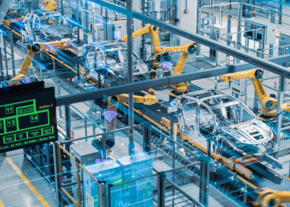
Competitiveness emergency for the European automotive industry. The alarm raised by ACEA
Simonluca Pini – Contributing editor for Il Sole 24 Ore
The European Automobile Manufacturers’ Association asks EU leaders drastic acts to save the entire sector and underlines how the Euro 7 will increase the price of new cars by 2,000 euros
Greater attention to the entire automotive sector and a call to accelerate actions in order to ensure higher competitiveness for the European industry within the green transition. These are the main claims addressed by ACEA (European Automobile Manufacturers’ Association) aimed at drawing the European Union’s attention to the competitiveness emergency that the automotive sector is facing. The reason? After playing a central role in the global automotive scenario since the post-war period, and very often introducing technological innovations that changed the entire sector - starting from traction control or the ABS system - now the balance is radically changing.
Competitiveness at risk
The European automotive industry has never been in more danger. Speaking at the European Parliament hearing in Brussels at the end of March, ACEA President Luca de Meo stated: “Europe and its automotive industry are at a fundamental turning point. The challenges are enormous, as is the pressure on the automotive industry."
“Today, European vehicle manufacturers are facing a very asymmetrical challenge. We are no longer leading the technological race,” said de Meo. “At the same time, as purchase incentives for zero-emission vehicles wane in the EU, we note massive support to our competitors in China and the US. All of this is happening in a context where overall European competitiveness is eroding.”
Sigrid de Vries, general manager of ACEA explained: “A major challenge for the automotive sector over the last years has been the sheer volume of new legislation, spanning from tailpipe CO2-emissions reduction to the incorporation of sustainability and due diligence criteria into automotive-related legislation. And while the legitimacy of these initiatives is not in question, and industry heavily invests in delivering on their goals, Europe can and should do better for legislation to be coherent, achievable and competitive in a global context.”
EURO 7 cars, prices increased by 2000 euros
If the transition to fully electric mobility is to be the biggest challenge facing the entire sector, first we will have to face and be ready for the introduction of the EURO 7 standard. “The recent Euro 7 proposal on pollutant emissions is a prime example of a regulation that will add complexity and uncertainty to key decisions and investments of European vehicle makers, without bringing the environmental benefits it claims to deliver,” continues De Meo.
The current Euro 6 standard, together with the growth of electric vehicles, has the potential to make possible an 80% reduction in terms of NOx emissions by 2035 compared to 2020. The Euro 7 proposal would bring at most 4 additional points for cars and 2 additional points for trucks. This marginal impact would have a decidedly high cost. ACEA, in fact, estimates that the Euro 7 proposal would lead to an average increase of 2,000 euro in the price of a new car. What does this mean in our everyday life? Many car drivers would be forced to extend the life of their cars already old. “Since fleet renewal is the most powerful tool to curb both CO2 and pollutant emissions, we should be looking for ways to accelerate it,” said de Meo. “We must also consider additional opportunities, using the right tools and acting where it makes sense. For air quality, we should focus on big urban areas, respecting the subsidiarity and proportionality principles, because this is where it is a real issue.”
Competitiveness at risk
The European automotive industry has never been in more danger. Speaking at the European Parliament hearing in Brussels at the end of March, ACEA President Luca de Meo stated: “Europe and its automotive industry are at a fundamental turning point. The challenges are enormous, as is the pressure on the automotive industry."
“Today, European vehicle manufacturers are facing a very asymmetrical challenge. We are no longer leading the technological race,” said de Meo. “At the same time, as purchase incentives for zero-emission vehicles wane in the EU, we note massive support to our competitors in China and the US. All of this is happening in a context where overall European competitiveness is eroding.”
Sigrid de Vries, general manager of ACEA explained: “A major challenge for the automotive sector over the last years has been the sheer volume of new legislation, spanning from tailpipe CO2-emissions reduction to the incorporation of sustainability and due diligence criteria into automotive-related legislation. And while the legitimacy of these initiatives is not in question, and industry heavily invests in delivering on their goals, Europe can and should do better for legislation to be coherent, achievable and competitive in a global context.”
EURO 7 cars, prices increased by 2000 euros
If the transition to fully electric mobility is to be the biggest challenge facing the entire sector, first we will have to face and be ready for the introduction of the EURO 7 standard. “The recent Euro 7 proposal on pollutant emissions is a prime example of a regulation that will add complexity and uncertainty to key decisions and investments of European vehicle makers, without bringing the environmental benefits it claims to deliver,” continues De Meo.
The current Euro 6 standard, together with the growth of electric vehicles, has the potential to make possible an 80% reduction in terms of NOx emissions by 2035 compared to 2020. The Euro 7 proposal would bring at most 4 additional points for cars and 2 additional points for trucks. This marginal impact would have a decidedly high cost. ACEA, in fact, estimates that the Euro 7 proposal would lead to an average increase of 2,000 euro in the price of a new car. What does this mean in our everyday life? Many car drivers would be forced to extend the life of their cars already old. “Since fleet renewal is the most powerful tool to curb both CO2 and pollutant emissions, we should be looking for ways to accelerate it,” said de Meo. “We must also consider additional opportunities, using the right tools and acting where it makes sense. For air quality, we should focus on big urban areas, respecting the subsidiarity and proportionality principles, because this is where it is a real issue.”
























